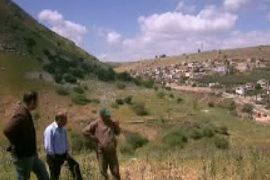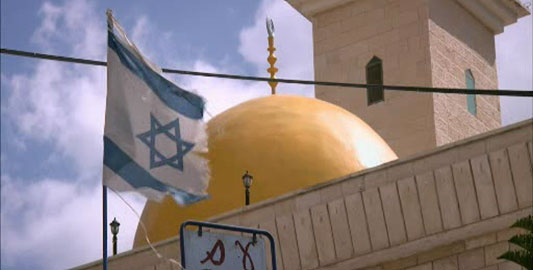A Journey Home, Part Three
From Denmark to Palestine – one man’s journey to the home he has never known.

 |
| A new Arab-Israeli village stands near the spot where Wadi El Hamam once stood |
In the final instalment of A Journey Home, a special three-part series marking the Nakba, Al Jazeera’s Awad Joumaa and his father Hussein have travelled from Denmark to Lebanon where both men grew up.
At the Lebanon-Israel border, they reflect on the final stage of their journey – returning to their ancestral home in what was once Palestine.
| Part Three – Returning home |
Inside Israel, before we head to the site of my father’s old village, we stop at the shores of Lake Galilee as he takes it all in.
Wadi El Hamam is the name of the small village near Tiberius in the Galilee region of North Palestine where my father was born.
When he finally sets foot in his old village – or at least what is left of it – he finds some old stones marking the spot where his father’s house had been.
Then he tells me the story of what happened on the night his family fled.
“Our village was attacked by the Jewish militia just after sunset. We only had two rifles but our women were clever. They emptied the water barrels and banged on them, which – in the valley where we lived – sounded like gunfire. The militia retreated giving us just enough time to get away. Had we stayed, we would have been killed.”
| IN VIDEO: A Journey Home, Part Three |
But some of the villagers did stay seeking safety in nearby towns and villages and eventually carved out a life for themselves as Palestinians in the new state of Israel.
Some of those who fled my father’s village, hiding in caves and other villages until the fighting had stopped, returned and built a new village just metres from the one they had lost.
They, in turn, were joined by other Palestinians who had been forced from their villages and placed there by the Israeli army. It is here my father discovers family he did not know he had.
“I was astonished to discover we still had family here. For the last 60 years we thought we had no family left,” he said.
“They knew where our house and land used to be. It was a great feeling.”
But the homecoming is bittersweet. When we talk about what it feels like to see his land and his home for the first time, it is simply too much and he breaks down.
“Tears will not bring back the homeland nor cure the longing of people who once lived here. That is why we’ve fought all of these years. Maybe we did not achieve anything but my faith in the future and the new generation is strong.”
After everything my father and the Palestinian people have been through, I ask if we can ever live side by side with the Israelis.
He tells me: “We have lived together since Moses and can live together again. But will they give us a chance to do that? That is the question. It is not whether we want to co-exist. Can they live with us?”
From Denmark, through Lebanon and into Palestine, with our journey at its end, my father saw what he had come for – the place of his birth and the land of his ancestors.
He may have been forced to leave but – but like all Palestinian refugees – his spirit remained with the land.
“Just because we are buried outside Palestine does not mean we cease to be Palestinian. The new generation will continue thinking about Palestine,” he said.
“Looking for your identity takes generations. As long as we are looking for our identity, Palestine will always be the goal.”
